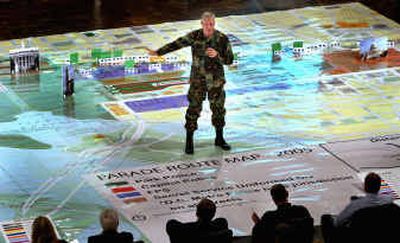Unprecedented security

WASHINGTON – Part of the theme of next week’s second-term inauguration of President Bush is “Celebrating Freedom,” but to provide the security to do so, the federal government will deploy a record number of troops and police and impose unprecedented restrictions in the first presidential swearing-in since the Sept. 11 attacks.
More than 13,000 law enforcement and military personnel from at least four dozen local, state and federal agencies will be on hand Jan. 20 to safeguard everything from the Washington riverfront to downtown hotel ventilator shafts during President Bush’s noontime oath of office at the Capitol, the ensuing parade down Pennsylvania Avenue and the nighttime string of inaugural balls.
“Our goal is that any attempt on the part of anyone or any group to disrupt the inaugural will be repelled by multiple layers of security,” Homeland Security Secretary Tom Ridge said Tuesday.
Ridge spoke at a news conference in front of the Capitol called to give the public, and would-be terrorists, a taste of the magnitude of the security effort.
Arrayed around Ridge were five large mobile command vans and several specialized security units, including a bomb-detecting K-9 squad, a chemical threat detection unit and a team of elaborately outfitted military “Extractors” trained to pull people from collapsed buildings.
Ridge said that there is no intelligence to suggest a particular terror threat, and that there are no plans to raise the national threat level, which has been at yellow, the mid-point on the five-color scale, for a year.
Heightened security appears to be crimping the planned partying only slightly, if at all, although it has upset protesters with a range of political grievances.
Ridge promised security “at the highest levels they’ve ever been for any inauguration,” including a series of high-tech precautions to go with such time-honored measures as sealing manhole covers and deploying squads of plainclothes police and rooftop snipers.
Officials will monitor images from cameras in helicopters hovering overhead and from hundreds of terrestrial surveillance cameras, as well as air quality data from chemical and biological sensors.
The no-fly zone around Washington, normally 16 miles from the Washington Monument for small planes, has essentially been tripled to include an area within 23 miles of Washington’s Reagan National Airport, Dulles International Airport and Baltimore/Washington International Airport.
All of this should be relatively unobtrusive, said Maj. Gen. Galen Jackman, commander of the Military District of Washington, who attended Ridge’s news conference.
“A lot of it will be in the background,” Jackman said. “I don’t think people will feel an (military) encampment mentality.”
Jackman said about 7,200 troops will participate in the inaugural, with 2,500 detailed to specific duties and the rest with ceremonial assignments.
Civilian law agencies, such as Washington, U.S. Capitol and U.S. Park Police, will have 6,000 police working, according to government agencies.
Kristinn Taylor of Free Republic LLC, a self-described independent conservative group that wants to offer an alternative presence to anti-war protesters, complained that the Secret Service has given murky guidance about what protesters can carry with them.
“As of right now, I don’t know if I can bring a portable radio or a little flag on a stick,” Taylor said.
Anti-war protesters are unhappy with the amount of space reserved along the parade route for the Presidential Inaugural Committee.
“The government is privatizing Pennsylvania Avenue and making it available only to the Bush-Cheney inaugural committee,” which limits tickets to its supporters, said Mara Verheyden-Hilliard, an attorney for a coalition of anti-war groups.
District officials estimate they will spend $17.3 million on security, more than double spent in 2001.
That is a sore subject for Mayor Anthony Williams, who complained that the district would be forced to divert $11.9 million earmarked for homeland security projects to cover costs for the inaugural.